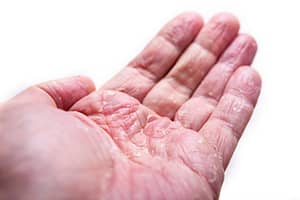
Skin Problems: Acne, Eczema, Dermatitis, Psoriasis and Hidradenitis Suppurativa
Skin problems like acne, eczema, dermatitis, psoriasis, and hidradenitis suppurativa are all inflammatory skin conditions that are often related to:
- Abnormal bowel ecology: This is the overgrowth of unwanted organisms in your gut and a lack of good, healthy bacteria, also termed dysbiosis.
- Food sensitivities: These are mild food allergies that are common. These reactions can be subtle and they are usually a delayed reaction. This is unlike conventional food allergies that are severe, potentially life-threatening and immediate, like a peanut allergy. Sensitivities can be caused by specific antibodies called IgG or IgA antibodies, as opposed to serious food allergies that are caused by IgE antibodies. IgE antibodies are the ones that medical doctors test for by a skin prick test. That type of testing does not check for IgG or IgA antibodies. Food sensitivities are difficult to determine without IgG and IgA testing because the reaction is not immediate and not severe. So, it’s difficult to make a correlation with a particular food.
- Inflammation: There are multiple factors that cause or contribute to inflammation in your body. It can be due to high insulin levels, food sensitivities, lack of essential fatty acids, poor diet in general, sedentary lifestyle, latent or low-grade infection, oxidative stress, environmental pollutants, hormone imbalance, and dysbiosis.
- Vitamin or mineral deficiencies: If you are lacking in nutrients like vitamin D and zinc you may be prone to skin problems. Although, there are many other vitamins and minerals that may be involved.
Steroid creams that suppress your immune system often offer temporary relief, but we prefer to address the reason why your immune system is creating this excessive inflammation in your skin.
Our naturopathic doctor can help you determine the root cause of your skin problems. She will then put together an individualized treatment plan to help you remove food sensitivities, cleanse your gut and restore healthy gut ecology, reduce skin inflammation, restore nutrients, and advise you on the correct diet for you.
By Dr. Pamela Frank, Naturopathic Doctor, updated March 13, 2022
Eczema, Dermatitis and Psoriasis Natural Medicine: Research
Brewer’s Yeast and Hidradenitis Suppurativa:
Cannistra C, Finocchi V, Trivisonno A, Tambasco D. New perspectives in the treatment of hidradenitis suppurativa: surgery and brewer’s yeast-exclusion diet. Surgery. 2013; 154(5):1126-30.
● Brewer’s yeast-free diet for 12 months resulted in immediate stabilization of symptoms in all participants
● Skin lesions regressed over the treatment period; all patients demonstrated an immediate recurrence of skin lesions following accidental or voluntary consumption of brewer’s yeast or wheat
● Increase in quality of life and activities
Vitamin D:
Vitamin D insufficiency may be higher in psoriasis patients and it is also correlated with obesity. Source: J Am Acad Dermatol, 2012 Mar 1.
Vitamin D insufficiency in pemphigus vulgaris patients may exacerbate the disease through various immune-related mechanisms. Source: J Eur Acad Dermatol Venereol, 2013 May 10; [Epub ahead of print].
Vitamin D supplementation in patients with atopic dermatitis was found to help ameliorate clinical signs of the disease. Source: J Am Acad Dermatol, 2013 May 2
Probiotics/Good Bacteria:
Low intestinal microbial diversity may be connected to atopic eczema in infants. Source: J Allergy Clin Immunol, 2011 Dec 6.
Long-term supplementation with standardized Lactobacillus rhamnosus cell lysate daily may improve skin symptoms and day- and night-time irritation in children with eczema. Source: Inflamm Allergy Drug Targets, 2010; 9(3): 192-6.
Probiotic supplementation during pregnancy prevented atopic eczema in offspring ages 2 to 7. Source: Br J Nutr, 2011 July 26.
Infant supplementation with Lactobacillus rhamnosus HN001 until 2 years of age reduces the prevalence of eczema at age 4. Source: Clinical & Experimental Allergy
Administration of probiotics in infants during gestation to 6 months of age reduced the prevalence of atopic eczema. Source: Arch Dis Child 2012; 97:A2
Probiotic supplementation in pregnant women was found to reduce the risk of the infant developing eczema in the first 24 months of life. Source: J Allergy Clin Immunol. 2012 Oct 16.
Atopic dermatitis patients given Lactobacillus plantarum CJLP133 saw a lower total eosinophil count compared to baseline. Source: Pediatr Allergy Immunol. 2012 Nov;23(7):667-73. Epub 2012 Oct 11.
Vitamin E:
The third and fourth quartiles of serum alpha-tocopherol were associated with 67% and 64% reduced risks respectively of atopic eczema in children aged 10-13. Source: Pediatr Allergy Immunol, 2010 Apr 30.
Blackcurrant seed oil:
Supplementation with blackcurrant seed oil in pregnant women and children up until 2 years of age was found to reduce the prevalence of atopic dermatitis (33% vs. 47.3%) when infants were 12 months old. Source: Clin Exp Allergy, 2010 June 9.
Supplementation with black currant seed oil (alpha-linolenic and omega-3 combination) and prebiotics. Source: JAMA Dermatol, 2013 March; 149(3): 350-5.
Nutritional Supplements:
Administration of nutritional supplements was found to be effective at preventing atopic dermatitis in 11 of 17 studies, and at decreasing severity of atopic dermatitis in 5 of 6 studies. Source: JAMA Dermatol, 2013 March; 149(3): 350-5.
Nutritional supplementation was shown to be an effective method in preventing atopic dermatitis or decreasing its severity in infants and pregnant or breastfeeding mothers. Source: JAMA Dermatol. 2013 Mar;149(3):350-5.
Calendula:
Treatment of diaper dermatitis with topical calendula cream containing extract from C. officials flowers led to fewer rash sites. Source: Scientific World Journal. 2012; 2012:810234.